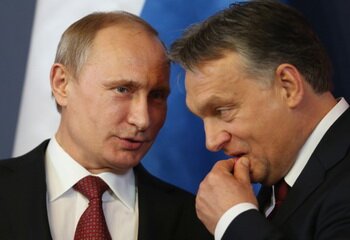
What is behind Hungary-Russia cooperation in energy sphere?
Ivan Sichen
Hungary's coordinated anti-Ukrainian policy reveals the true essence of the ruling in that country regime of V. Orban — the main conductor of Russian interests in Central and Eastern Europe. Last week, Hungary once again confirmed this, having blocked the NATO's special meeting on Ukraine, which was scheduled for October 3-4, 2018. At this, Budapest once again made far-fetched accusations against Ukraine about the alleged violation of the rights of the Hungarian minority on its territory.
| Hungary supports of Russia's intentions to strengthen its positions in the EU’s gas market with the prospect of actual monopolizing it |
It is significant that, just like before the NATO summit in July this year, this step was taken by Budapest shortly after Hungarian Prime Minister V. Orban's meeting with Russian President V. Putin in Moscow on September 18, 2018. At this, their meeting reiterated Hungary's support of Russia's interests on another strategically important issue for both Europe and Ukraine, namely, Moscow's intentions to strengthen its positions in the European gas market with the prospect of actual monopolizing it.
For example, during the talks, V. Orban called on V. Putin to consider extending the future “Turkish Stream” gas pipeline to Hungary. Thus, a step was taken to meet Russian plans to significantly increase the volume of Russian gas supplies to Europe, and to exclude from the list of the countries providing its transit, real and potential opponents of Moscow's imperial policy, such as Ukraine, Belarus, Poland and Lithuania. It is for this purpose that Russia is taking measures for implementing two pipeline projects, including the “Nord Stream” — along the bottom of the Baltic Sea and the “Turkish Stream” — along the bottom of the Black Sea.
At the same time, the leadership of the EU is against new Russian pipeline projects, seeing in them a serious threat to security of the European Union and its partners, most of all — Ukraine. First of all, this concerns the possibility of Russia's gaining additional levers of influence on the EU in the energy, and therefore in the political, spheres. Besides, under the pretext of protecting gas pipelines, Russia can significantly strengthen its military presence in the Baltic and Black Sea regions, where its interests is directly contrary to the interests of NATO and the EU.
| Budapest's strategic plans provide for transformation of Hungary into one of the largest gas hubs in Central and Eastern Europe |
However, let's see what Hungary is after while flirting with Russia in the energy sphere. Undoubtedly, an opportunity to get relatively cheap Russian gas. However, this is only a tactical goal. Budapest's strategic plans provide for transformation of Hungary into one of the largest gas distribution centers (hubs) in Central and Eastern Europe, which would significantly strengthen Hungarian positions in the region as opposed to Austria. Thus, against the background of deepening energy cooperation with Russia, Hungary participates in the implementation of a number of other energy projects, including those that completely contradict Russian interests.
| Existing and planned gas pipelines in Southeastern Europe |
In particular, in July 2017, Hungary, Bulgaria, Romania and Greece signed a memorandum of understanding within the framework of the “Vertical Gas Corridor” project, which should interconnect their gas networks. At this, they are considering a possibility of getting natural gas from both — the “Turkish Stream” gas pipeline and the alternative Trans-Anatolian gas pipeline (TANAP, which connects Azerbaijan and Greece through the territory of Turkey). At the same time, by 2020, the BRUA (Bulgaria-Romania-Hungary-Austria) gas pipeline has to be launched from gas fields on the Romanian shelf of the Black Sea to Austria through Romania, Bulgaria and Hungary.
Hungary's diaspora in Ukraine, compactly residing in the area of the final section of the Ukrainian gas transportation system (GTS) in Trans-Carpathian region, where large gas storage facilities are located, can also be involved in the realization of Hungary's energy interests. Thus, in case of Hungary's plans to create Hungarian autonomy in the region coming true, Budapest may raise the question of gaining access to the Ukrainian GTS. By the way, Hungary also demands from Romania to create a similar Hungarian autonomy…
|
|
Given such prospects, in February 2018, Hungarian Prime Minister, V. Orban, openly declared “the end of the era of the Russian gas monopoly”. Thus, he once again confirmed the outspoken double-dealing of Hungary's policy, which is guided exclusively by its own interests and acts on the principle of “talk out of both sides of mouth”. Understanding this fact should be the basis for building relations with Hungary by all other countries, including Ukraine, NATO and the EU, as well as Russia.

